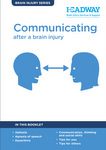
Get the booklet
Download Communicating After a Brain Injury in pdf format
Communication
Communication is a two-way process.

Communication means understanding other people.

Communication means other people understanding you.
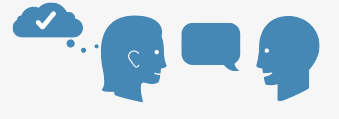
Communication also means taking in information.
How do we communicate?
We communicate:
by speaking

by listening
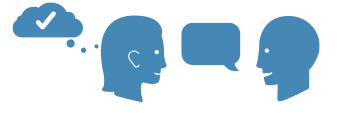
by reading and writing

by seeing
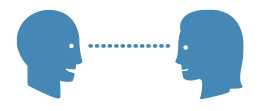
We communicate with body language.
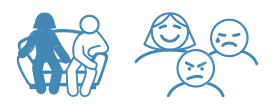
Communication also uses thinking skills.
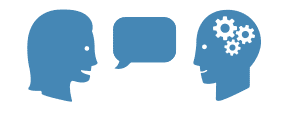
Communication uses social skills.
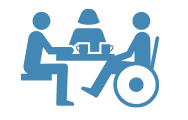
Examples of social skills are:
- Allowing other people to talk.
- Not saying things that may offend other people.
- Standing at the right distance from other people.
Changes in language
Aphasia
Aphasia affects language.
In most people the left side of the brain controls language.
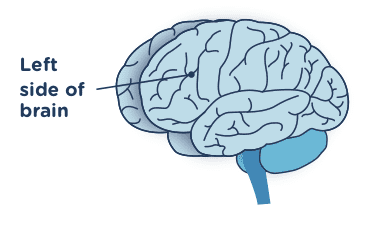
Aphasia can affect:
talking

Aphasia can affect:
understanding

Aphasia can affect:
writing
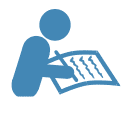
reading

and using numbers.
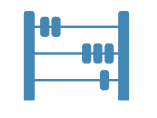
Aphasia is different for different people.
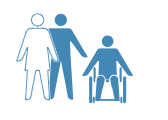
Changes in speech
Dysarthria
Dysarthria is a speech difficulty.
Dysarthria is caused by muscle weakness.
The muscle weakness is caused by nerve damage after a brain injury.
Your speech may be slurred.

Your speech may be quiet.
Your speech may be slow.

Apraxia of speech
Apraxia of speech is a difficulty coordinating the muscles used for speech.
You may mix up sounds in words.
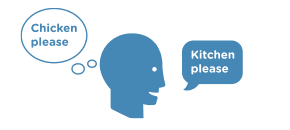
Longer words are more difficult –
for example:
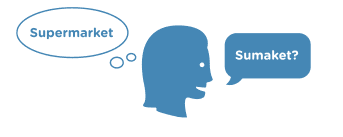
It may help to break up longer words.


General tips for you
Choose a quiet place to talk.
Turn off distractions in the background.

Talk one-to-one where possible.
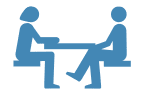
Keep eye contact.

Ask the other person if they understand.
Try to limit conversations when you feel tired.

Use pen and paper or drawings and pictures.

Use gestures.

A smart phone, ipad or other electronic device may help. Get advice from a Speech and Language Therapist.

Speech and language therapy, exercises and strategies may help.
Tips for other people
Bear in mind that having a communication difficulty does not necessarily mean any change in a person’s intelligence.
Choose a quiet place.
Talk one-to-one when possible.

Face the person. Get their attention before talking.
Keep eye contact. This helps you both to know if communication is going well or not.

Speak clearly, without rushing. Use short sentences.
Only ask one question at a time. Wait for the answer.
Ask ‘Yes’ / ‘No’ questions if necessary.
Be patient. Give enough time to respond.
Try not to finish their sentences.

Do not pretend to understand the person if you do not.
Repeat back what you think they meant. Ask if this is correct.

If needed, try other ways to communicate: gestures, pictures, pen and paper or any devices the person uses to communicate.

Thinking skills and communication
A brain injury may affect thinking skills.
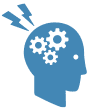
Thinking skills may affect communication. Common difficulties are:
Forgetting what you said or did.

Switching from one subject to another.
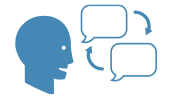
Getting ‘stuck’ on one subject.

Needing more time to take in what is being said.

Not being able to realise when someone is joking or being sarcastic.
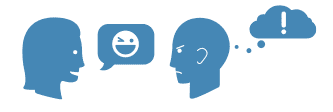
Tips that may help you
Ask if you are repeating yourself.

Ask for feedback.

If someone changes to a new topic, stick with the new topic.
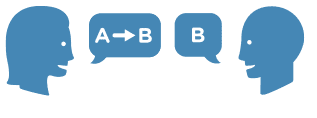
Tips for friends and family
Try to maintain eye contact.

Give the person enough time to respond.

If they get stuck on a topic, ask a question to change the topic.
Avoid sarcasm if the person tends to take things literally.

Social skills and communication
The brain’s Frontal Lobes control social skills.
An injury to the Frontal Lobes can affect social skills.
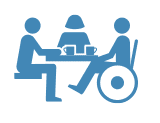
Social skills affect communication.
Some difficulties after a brain injury are:
Saying things that may offend others. Being overly familiar.
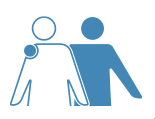
Interrupting other people. Talking too much.
Not noticing other people’s body language for example: someone fidgeting if they want to leave.
Tips that may help you
Try to keep eye contact. Keeping eye contact may help you notice other people’s reactions.

Be open to getting feedback about your social skills.

Tips for friends and family
If the person is talking too much, try to change the topic of the conversation.
If they have behaved in a socially unacceptable way, they may be unaware they have. Give them feedback discreetly and in private.

Help and information
Speech and Language therapy may help.
Ask your GP or Public Health Nurse about a HSE Speech and Language therapist.
t: 1800 700 700
w: www.hse.ie
For a private Speech and Language Therapist, contact the Independent Speech-Language Therapists of Ireland.
Aphasia Ireland
Their goal is to raise awareness of aphasia and offer support.
t: (01) 7642 200
w: www.aphasiaireland.ie
You can also contact Headway Information and Support staff.
t: 1800 400 478
e: info@headway.ie
Acknowledgement
Thank you to the City of Edinburgh Council who gave us permission to use their Bonington Symbol System (BSS).

